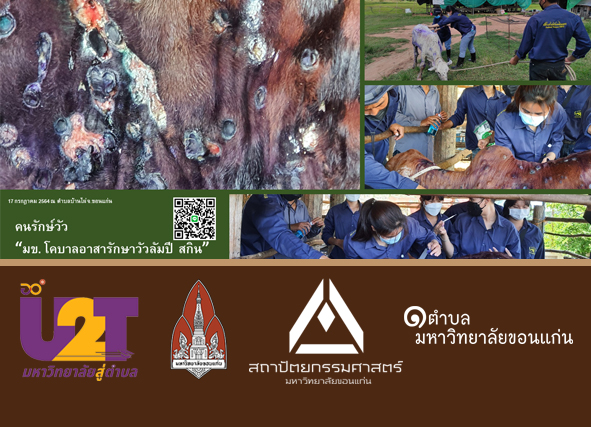19/07/2021
An outbreak of “Lumpy Skin” Disease, a virus originating in cattle, buffalo, and other ruminants, has led to a serious crisis and an accumulation of sick and dying animals. This is the first outbreak of Lumpy Skin Disease in Thailand. Due to the urgency of the issue, the government is prioritizing a response, looking for the best way to hasten an end to the epidemic before it causes serious harm to cattle and buffalo farmers.

As part of the U2T Project, Khon Kaen University’s Faculty of Architecture scheduled a workshop on how to prevent and treat Lumpy Skin Disease in cattle and buffalo. The workshop aimed to spread accurate knowledge and understanding about the epidemic and strengthen subdistrict-level activities carried out in response to it. A group of 50 attendees benefited, including livestock volunteers and community leaders, farmers in the subdistrict, and locals of Ban Phai Subdistrict, Ban Phai District, Khon Kaen. The training took place on 17-18 July 2021, from 08.30-16.30 in the Ban Phai Subdistrict Administrative Organization Meeting Room.

The weekend included introductory lectures on healthcare for cattle farmers in the context of Lumpy Skin Disease, with a special focus on preventing and treating the Lumpy Skin Epidemic in cattle and buffalo. Participants also had the opportunity to practice checking for and treating the disease at a local village farm currently hit by the epidemic. Asst. Prof. of Veterinary Medicine Chaiwat Jarassaeng, under the Department of Animal Science at Khon Kaen University’s Faculty of Veterinary Medicine, advised and answered participants’ questions.

The U2T Project aims to promote social and economic growth in communities via universities acting as “System Integrators,” restoring the economy at the community level while leading development that responds directly to community problems and needs.

News: Pimchanok Srisuriyamart
Photography: Asst. Prof. Dr. Chanasda Chullasthira


